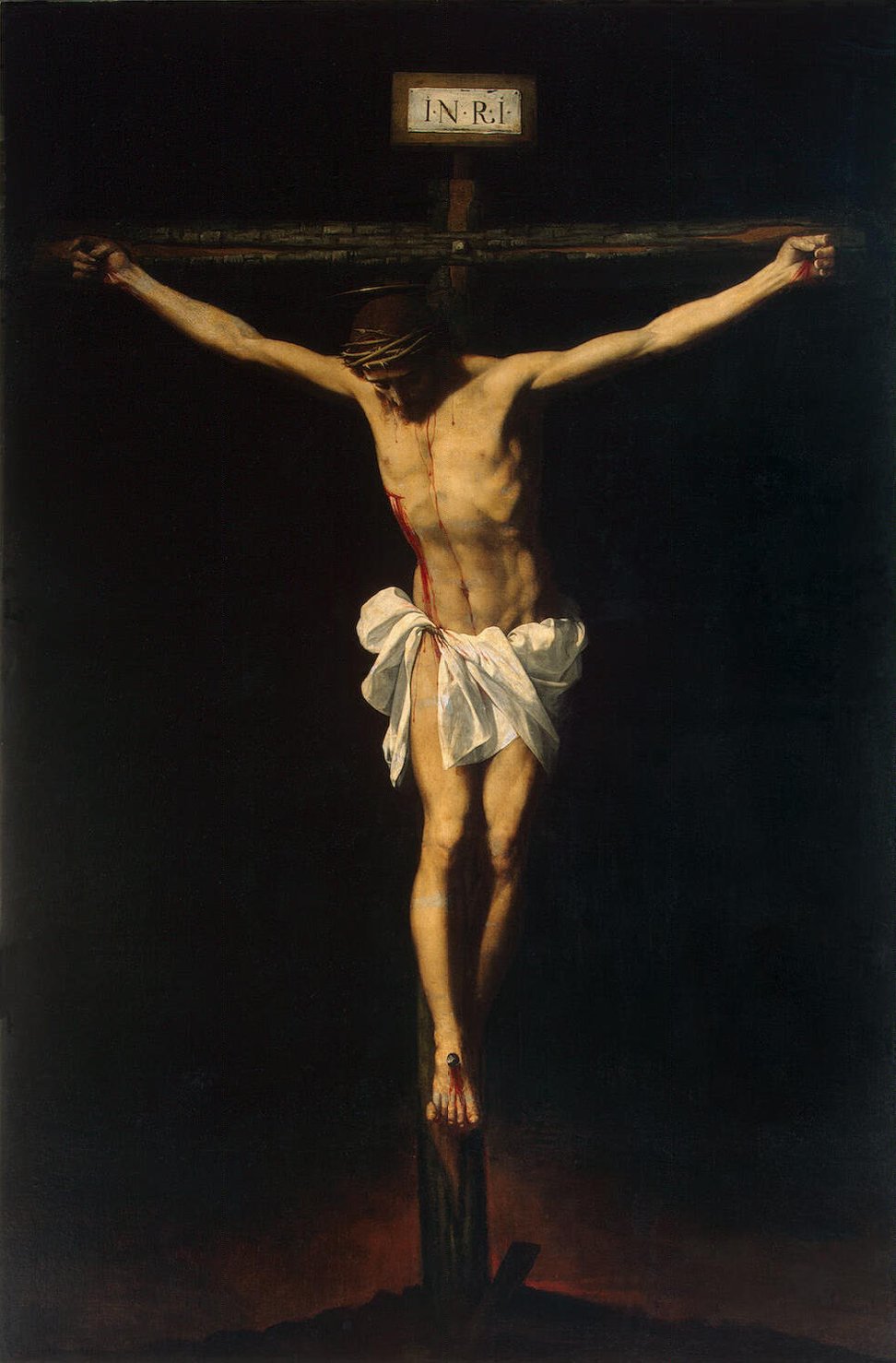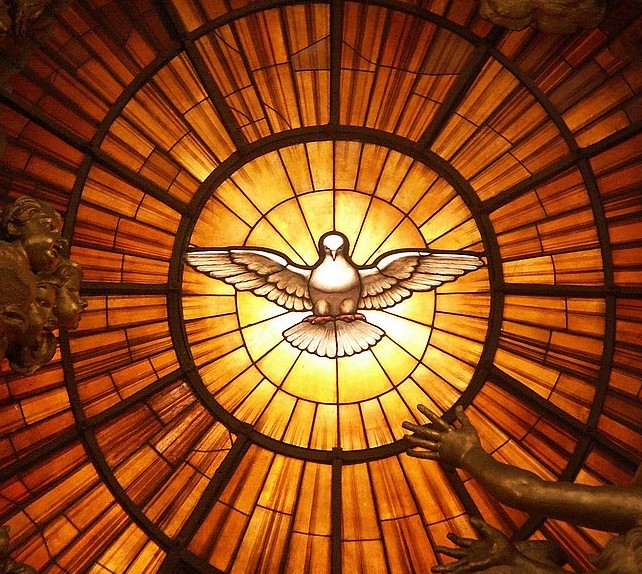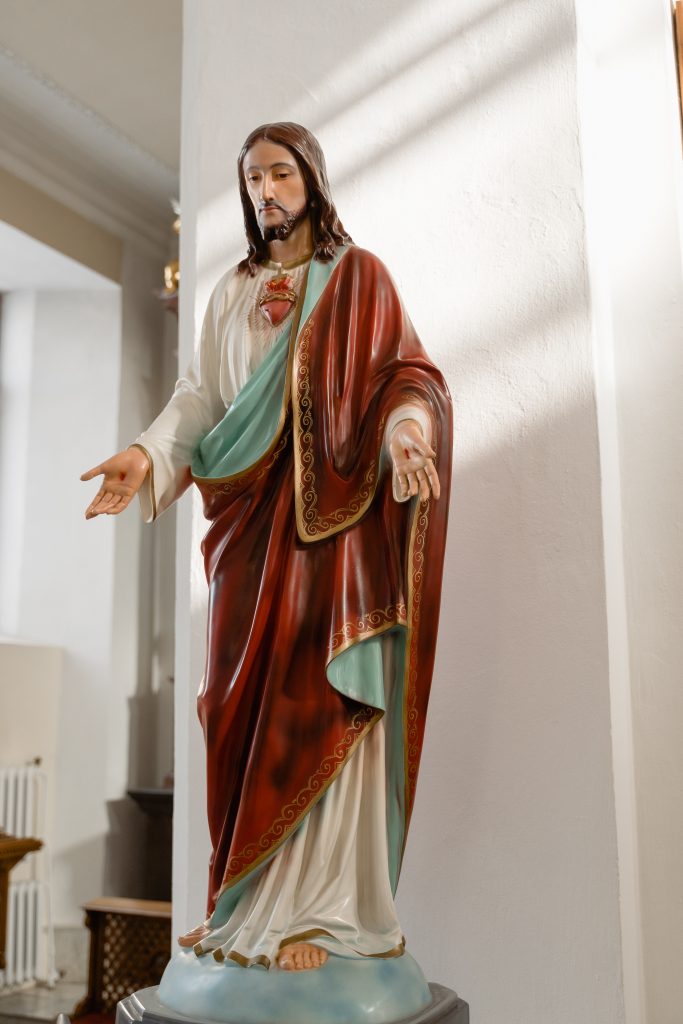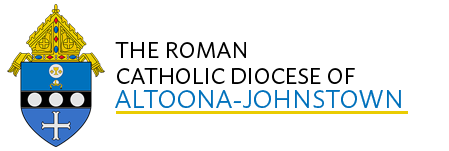Welcome
We, the Roman Catholic Church of Altoona- Johnstown, welcome you and invite you to explore the beauty of our faith. Whatever you are searching for, whatever you long for in your heart, we say as St. Peter says in Matthew 17:4, “It is good that we are here!” Our faith, this Church, is here to help you on your journey, to encounter a loving God, and to live a life of virtue and joy!
What is the Catholic Church?
Founded by the words and actions of Jesus Christ, fulfilled by his death and Resurrection, the Church has been created in order for us to fully encounter God, and be united with Him. The Church is the “people of God”, gathered as one throughout the world. Through local communities, the Church becomes real when Her members come together in prayer and celebration through Scripture and the Sacraments, especially at Mass. The Church is a family marked by certain characteristics (Catechism of the Catholic Church, 782):
- We become members of this family through faith in Christ and Baptism.
- Our origin is from God the Father, with Jesus Christ as our head.
- The Holy Spirit dwells within us, giving us the gifts of grace to live as Christ.
- Our law is to love as Jesus loved us.
- Our mission is to be salt of the earth and light of the world, proclaiming the Good News of Christ.
- Our destiny is perfect union with God in heaven.
This is who we are, this is the Catholic Church, and we want you to be a part of this family!
“You are a chosen race, a royal priesthood, a holy nation, God’s own people.” – 1 Peter 2:9
What does the Catholic Church believe?
Our core beliefs are summed up in the Nicene Creed, an ancient prayer adopted in 325 AD to assist the Church in proclaiming the Gospel and salvation found in Jesus Christ. This prayer holds the central truths of Jesus and His Church and continues to be professed at every Sunday Mass around the world today. Commentary on the Nicene Creed can be found in the Catechism of the Catholic Church, 198-1065.
“I believe in one God, the Father almighty, maker of heaven and earth, of all things visible and invisible.“
We as Catholics believe in one God who is the most high, without equal, and the creator of all things. He created us to show His glory, that we should share in his truth, goodness, and beauty. We however, due to sin, broke that relationship and separated ourselves from Him and His plan. Sin always leads to suffering and death while God has made us for joy and life.


“I believe in one Lord Jesus Christ, the Only Begotten Son of God, born of the Father before all ages. God from God, Light from Light, true God from true God, begotten, not made, consubstantial with the Father; through him all things were made. For us men and for our salvation he came down from heaven, and by the Holy Spirit was incarnate of the Virgin Mary, and became man. For our sake he was crucified under Pontius Pilate, he suffered death and was buried, and rose again on the third day in accordance with the Scriptures. He ascended into heaven and is seated at the right hand of the Father. He will come again in glory to judge the living and the dead and his kingdom will have no end.”
God, the Father, does not want His people to suffer and die, so He sent His Son Jesus to redeem us from our sins. Jesus, who is fully God and fully man, the second Person of the Trinity, and the Word through which the world was made, came to heal our relationship with God, other men, ourselves, and nature as well as to conquer sin and death. Through His life, death, and Resurrection, Jesus opened the doors to perfect unity with God and gave us the opportunity to share in His glory. Jesus instituted the Church as a community of faith, united in the Sacraments, where believers could be nourished on the path of holiness and union with God.
“I believe in the Holy Spirit, the Lord, the giver of life, who proceeds from the Father and the Son, who with the Father and the Son is adored and glorified, who has spoken through the prophets.”
The Holy Spirit, the third Person of the Trinity, is our consoler and advocate, assisting us in living a virtuous life and choosing the grace and salvation offered through Jesus. The Spirit, first coming upon the Apostles at Pentecost, continues to build and sanctify through the Sacraments of Baptism and Confirmation. When we accept these gifts and fruits received in these Sacraments and in prayer, Christ working through the Holy Spirit is able to Shepard us along the path to holiness.


“I believe in one, holy, catholic and apostolic Church. I confess one Baptism for the forgiveness of sins and I look forward to the resurrection of the dead and the life of the world to come. Amen.”
God gives us the Church to be His presence on earth. The Church is:
- One: Jesus established a unified people as one Church with one Lord, one faith, one Baptism, forming one Body under one authority of apostolic succession. It is Gods desire that all divisions be healed and His Church be unified.
- Holy: God calls all people to holiness, and the Church is His instrument to help us on our journey towards holiness.
- Catholic: The word “catholic” means universal. The Church and Her message is for all people, throughout all of history and time.
- Apostolic: Jesus intended the Church to be rooted in the authority He passed down through His Apostles, which continues through an unbroken chain of succession through their successors, the Pope and bishops.
The Church is to go out into the world, to help people enter into a relationship with God, and to baptize and teach the Good News of Jesus Christ.
Common Questions about Catholicism
Yes we do! The Catholic Church is actually the source and the one who defined the Bible, combining the Jewish scriptures and the apostolic writings of the first century. It wasn’t until the council of Hippo in 393 AD that the official list, or canon, of Scripture was developed and defined. We teach that the Bible contains the divinely inspired living Word of God. God is the author of Sacred Scripture, as He is the one who inspired its human authors. Due to this, we are assured that these writings teach without error the truth of God’s revelation to man. (CCC 134-136)
The life of the Catholic Church, including its teachings, prayers, and Sacraments are all Bible-based. We proclaim Sacred Scripture multiple times at every Mass, and many common prayers are directly sourced from the Bible. We however do not “… derive her certainty about all revealed truth from the holy Scriptures alone. Both Scripture and Tradition must be accepted and honored with equal sentiments of devotion and reverence.” (CCC 82, Dei Verbum 9)
Before Sacred Scripture was written and defined, the early Church, those who knew Jesus and knew the Apostles, preached the Gospel message. The Apostles handed down the teachings of Christ orally as well as in their writings through their disciples, known as bishops, for all generations. This living transmission of the faith is called Sacred Tradition. This Tradition is distinct from Scripture, but is complimentary. Sacred Tradition does not contradict Scripture, but instead provides a guide for how to interpret Scripture, which are thousands of years old. Both Scripture and Tradition, make up the sacred deposit of the Word of God, and are infused into the whole life of the Church (CCC 75-79, 96-98)
Jesus chose twelve Apostles, gave them special assignments, and were empowered by the Holy Spirit to spread the message of Christ. These were the first priests and bishops of the Church, and as they went throughout the world they made new bishops. All bishops in the Catholic Church are linked to the original twelve disciples by an unbroken chain of succeeding generations of bishops. Peter was chosen out of the twelve to be the “rock” of Christ’s Church, to be its head. This is found in Matthew 16:18 when Jesus says to Peter, “You are Peter, and upon this rock I will build my church.” From the earliest days of the Church, the bishops recognized the primacy of the bishop of Rome, the successor to St. Peter, appealing to him to resolve differences and clarify teachings. The Pope is a bishop, the bishop of Rome, the vicar of Christ on earth who rules in Christ’s place until Jesus comes again, whom other bishops elect. (CCC 84-95, 874-887, 935-938)
Jesus entrusted to Peter, and therefore his successors, the keys to the kingdom of God with the promise of divine protection in the latter half of Matthew 16:18, “…the gates of hell shall not prevail against it.” We believe that the Holy Spirit continues to guide and work in the Church in order for it to not teach error. Infallibility is limited to the following:
- That which has been taught by all Christians throughout all time, for example the Resurrection of Jesus Christ.
- When the Pope teaches in unison with all the bishops within the Church.
- When the Pope speaks ex cathedra, meaning ‘from the Chair of Peter’, in regard to teaching faith and morals, which has only happened twice.
In none of these cases can a Pope or a grouping of bishops teach any doctrines which contradict pre-established Tradition. They can only organically develop those pre-existing docrines which may have only appeared as seeds in the Tradition prior to a definitive teaching. This does not mean however that everything the Pope says or does is right, that he can’t sin, that we can’t disagree with something the Pope says, or that he is above Scripture or Tradition. Many Popes have sinned in terrible ways, but not in teaching the doctrines of the Church. We should respect the Pope and his office, and we must believe in infallible teaching, but what we do not have to believe or agree with are the private thoughts of the Pope in press conferences, private letters, or any time when the Pope is not explicitly speaking as the Pope. (CCC 84-95, 888-892)
No, we do not worship Mary or any of the Saints. Worship, or adoration, latria in Latin, is reserved for God alone and the Holy Sacrifice of the Mass is only offered to God. This is made clear in Exodus 20:3 “You shall not have other gods beside me.” We do however honor the Saints, dulia in Latin, because their lives have pointed to Jesus and have been models of the Christian life. So much so that they are currently alive in heaven. When we ‘pray to’ Mary or the other Saints, we are asking them to pray for us as we journey towards heaven. Just as we would ask a family member or a friend to pray for us, we ask our friends– who are close to God in heaven – to pray on our behalf and give us hope along our journey.
Mary is honored above the other Saints, hyperdulia in Latin, because through her full and unreserved ‘yes’ to God, Jesus entered into the world as our savior. Everything the Church teaches about Mary are taught to promote the identity of Jesus Christ.
God loves us and desires only goodness and happiness for us. We as a Church want everyone to experience and live in the fullness of life which Jesus reveals. Because the Church is the witness of God’s love to humanity, we are unable to compromise on the Truth which God offers, even when they are difficult. The Church cannot break from Sacred Scripture or Tradition which has always been taught. Christ welcomes everyone, even sinners, but He loves them so much that He calls them to leave their sin behind. Jesus calls Himself the Truth and the Light in Scripture, this Truth is the only path which will bring about the happiness and love which our hearts long for. Below are some Truths which the Church is unable to compromise because they are revealed to us by God:
Human Dignity– All people are created in the image and likeness of God and have intrinsic value. (CCC 1929-1933, 1944)
Life– All human life is sacred and must be protected and respected from the moment of conception until natural death. At all stages of life, a human being must be recognized as having the rights of a person. God alone is the Lord of life and death, which is why the Church advocates for the poor, those oppressed, opposes abortion, human trafficking, euthanasia, and capital punishment. (CCC 2270-2279, 2318-2324)
Discrimination, Racism, Equality– All people have the same and equal nature and dignity given to us by God which cannot be lost, is inherent, and permanent. Due to this, all forms of discrimination are profoundly sinful and incompatible with God’s design. (CCC 1934-1938)
Marriage– God made man and woman to be one together in marriage and participate in creation. The family is the fundamental unit of society. (CCC 2201-2213)
Sexual activity – Sex is a gift from God for the unity of spouses and the procreation of children. Any sexual act outside of marriage, which includes lustfulness, masturbation, pornography, and fornication goes against God’s plan for human sexuality. This is for all people, no matter a person’s sexual orientation, identity, or marital status. All are called to self-mastery through the virtue of chastity. (CCC 2337-2356, 2360-2372)
Contraception – Children are a natural end to the selfless act of life-giving love between spouses. Refusal to be open to life and the use of any form of artificial contraception is a barrier to that selfless love.(CCC 2366-2371)
Sexual Orientation – Those experiencing same- sex attractions must be accepted with respect, compassion, and sensitivity. Those with these attractions are called higher to unite their lives with Christ and embrace the virtue of chastity. (CCC 2357-2359)
Sexual Identity– Those experiencing gender dysphoria experience real suffering and must be supported with respect, compassion, and sensitivity. (CCC 2357-2359)
Salvation means being restored in God’s graces through the forgiveness of sin, given by God alone. All people are redeemed by the death and Resurrection of Christ, but being saved means freely accepting this grace and cooperating with it by living a life conformed to the Gospels. Catholics are “born anew” through the waters of Baptism and faith in Jesus Christ, but final judgement is by God alone when we die. Eternal life in heaven is determined at that time according to the justice and mercy of God in accordance of how we have lived our entire lives. Therefore, no one can know if they are saved until they stand before the judgment seat of God. (CCC 1021-1022,1051)
Purgatory is the state of those who die in God’s grace, assured of eternal salvation in heaven, but undergo a final purification, which is entirely different from the self-imposed punishment of hell. This teaching of the Church has been formulated through the interpretation of certain texts of Scripture from the early Church Fathers speaking of a ‘cleansing fire’ including: Psalm 66:12, Isaiah 4:4, Micah 7:9, Malachi 3:3, Matthew 5:26, 1 Corinthians 3:11-15, Revelation 21:27 and many more. This teaching is also based on the practice found in 2 Maccabees 12:44-45 of praying for those who have already died that “…they might be delivered from their sin.” It is a cleansing from sin and inclination to sin which stand in the way of the believer fully enjoying the presence of God in heaven, (CCC 1030 – 1032, 1054)
Catholics practice their faith through the Sacraments, prayer, and living a life of virtue. The Sacraments, which includes how we worship, “are efficacious signs of grace, instituted by Christ and entrusted to the Church, by which divine life is dispensed to us.” (CCC 1131) They are visible signs instituted by God to give grace in order for us to live more fully in communion with God. Prayer is the conversation with God to deepen our relationship with Him. Virtue is a disposition or habit of choosing and doing good. Virtue explains the quality of our lives and the good actions which reflect our life with God. This virtuous life brings greater good and the glory of God into the world. It is the grace that is received in the Sacraments and the intimate communion with God in prayer that enables a believer to live a virtuous life.
All of the people who make up the Church on earth are sinners, and She calls us to holiness and repentance for our sins. The Church Herself however is not only physical, but mystical, with Christ as Her head, the Holy Spirit as her soul, Mary as Her Mother, the many angels and Saints, and the souls in Purgatory praying for us continuously. The Church is holy because of Her founder, who made it an instrument of sanctification, and because the Spirit dwells within Her. She is the means of salvation for us and calls us to holiness, even in our sinfulness. We see this through the lives of the Saints. (CCC 823 – 829)
“The Church is therefore holy, though having sinners in her midst, because she herself has no other life but the life of grace. If they live her life, her members are sanctified; if they move away from her life, they fall into sins and disorders that prevent the radiation of her sanctity. This is why she suffers and does penance for those offenses. Of which she has the power to free her children through the blood of Christ and the gift of the Holy Spirit” – Saint Pope Paul VI (Credo of the People of God, 19)
If you were baptized into the Catholic Church, or if you received any of the Sacraments when you were younger, you’re still a Catholic, even if you haven’t been to Mass or don’t pray anymore. No matter where you are, the Catholic Church is always your spiritual home, waiting for you with arms wide open, welcoming you back at any time. All you have to do is show up! Visit your local parish and talk to a priest or parishioner. We want to welcome you and help you renew your relationship with Jesus Christ, so that He will be the source of your joy now and forever! As the old saying goes, “Once a Catholic, always a Catholic!”

